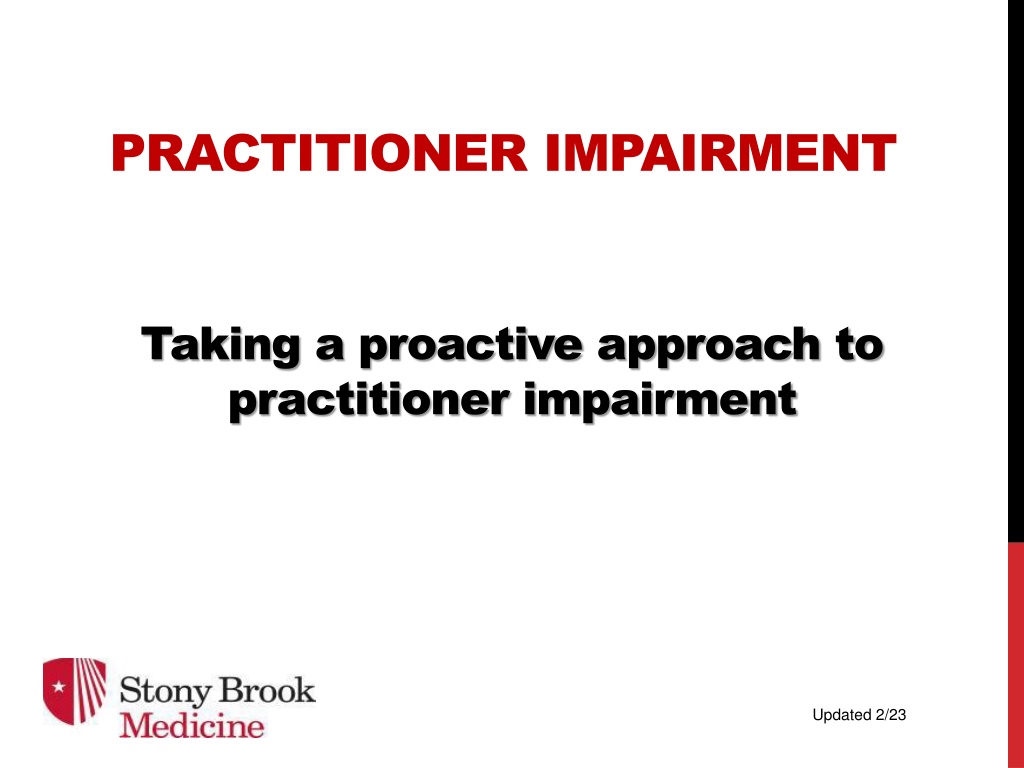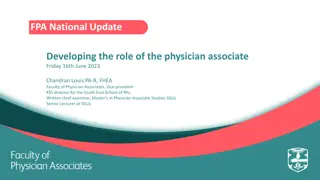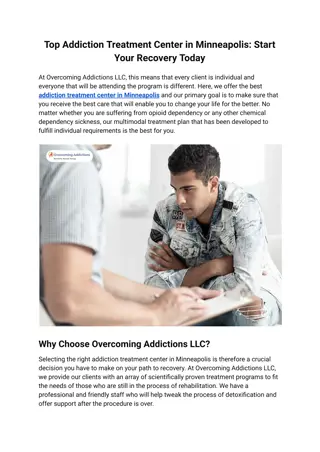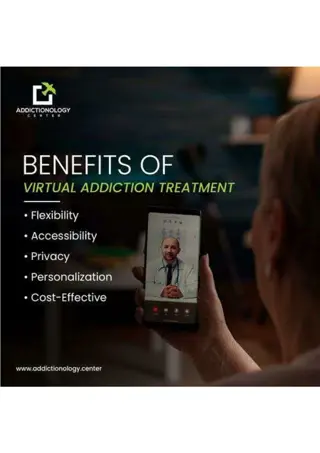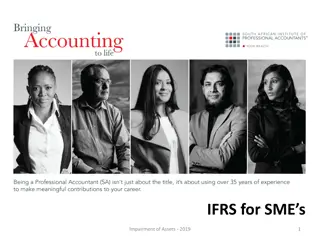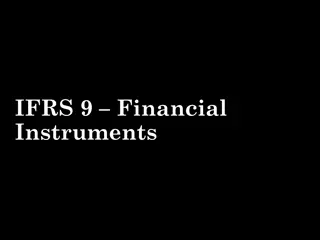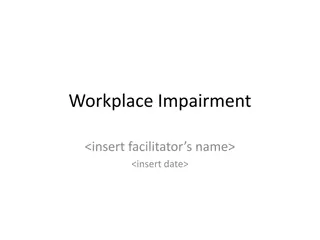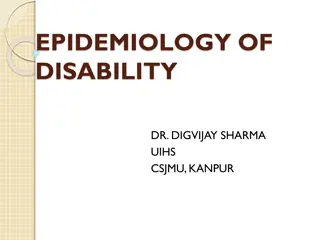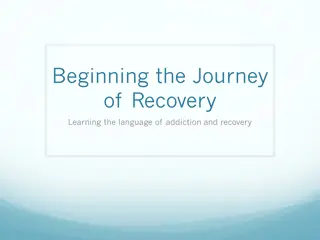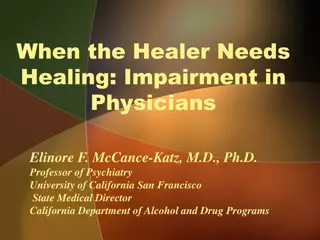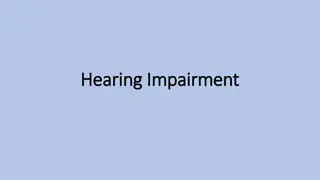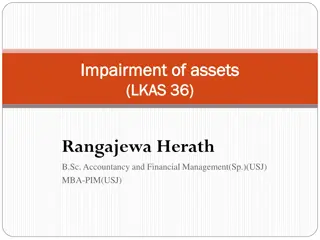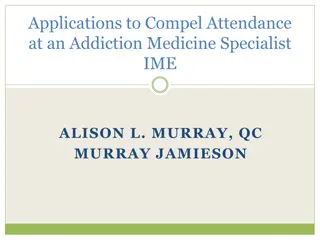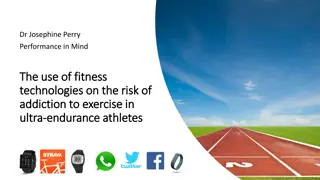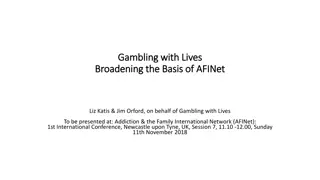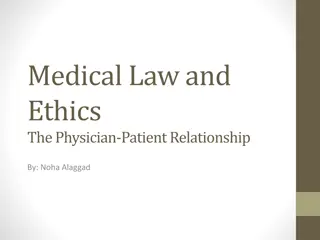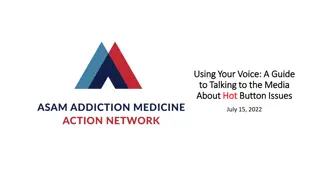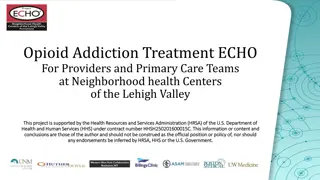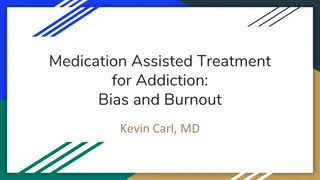Physician Impairment and Addiction Risks
Physician impairment due to mental illness, physical conditions, or substance abuse is a serious concern in the medical field. This article discusses the definition of impairment, signs of professional misconduct, and statistics related to substance use disorders among physicians. It emphasizes the importance of proactive approaches to identifying and assisting impaired physicians to ensure patient safety and physician well-being.
Download Presentation

Please find below an Image/Link to download the presentation.
The content on the website is provided AS IS for your information and personal use only. It may not be sold, licensed, or shared on other websites without obtaining consent from the author.If you encounter any issues during the download, it is possible that the publisher has removed the file from their server.
You are allowed to download the files provided on this website for personal or commercial use, subject to the condition that they are used lawfully. All files are the property of their respective owners.
The content on the website is provided AS IS for your information and personal use only. It may not be sold, licensed, or shared on other websites without obtaining consent from the author.
E N D
Presentation Transcript
PRACTITIONER IMPAIRMENT Taking a proactive approach to practitioner impairment Updated 2/23
Definition of Impairment An impaired physician is one who is unable to practice medicine with reasonable skill and safety because of a mental illness; a physical illness or condition that adversely affects cognitive, motor, or perceptive skills; or substance abuse. Federation of State Medical Boards of the United States, Inc. Report of the ad hoc committee on physician impairment. June 2005 r
Definitions of Professional Misconduct Education Law, Section 6530 (7) & (8) Practicing the profession while impaired by alcohol, drugs, physical disability, or mental disability Being a habitual abuser of alcohol, or being dependent on or a habitual user of other drugs, except a physician who is maintained on an approved therapeutic regimen which does not impair the ability to practice
YES, it can happen to you!!!! Estimates suggest that impairment related to a substance use disorder will affect 8% to 18% of physicians sometime during their life and that about 2% of physicians currently have an active problem with substance use Boisaubin EV, Levine RE. Identifying and assisting the impaired physician. Am J Med Sci 2001; 322(1):31-6 Other data indicate that rates of alcohol use disorders among physicians are equal to or greater than the general population: 21.4% - 25.6% among female physicians 12.9% - 13.9% among male physicians Oreskovich MR, Shanafelt T, et al. The prevalence of substance use disorders in American physicians. Am J Addict. 2015;24:30-8 Oreskovich MR, Kaups KL, et al. Prevalence of alcohol use disorders among American surgeons. Arch Surg. 2012;147:168-74.
Not all impaired physicians become part of these statistics. Some physicians have an impairment that is not obvious to others and are not involved in treatment. Others may have sought treatment on their own and in confidence. Still others may continue to practice with impairments while being "protected' by well- intentioned family members, friends, and colleagues.
The slippery slope to physician impairment
Profile of Addiction Compulsive seeking & use of prescription or illegal psychoactive substances Progressively deteriorating course Continued use despite negative consequences (magnified in medicine) Tendency to relapse Requires comprehensive recovery program
Doctors Treating Doctors Public Health Law 230-11 (e) Preserves physician/patient privilege even when patient is a doctor or a student No Office of Physician Medical Conduct (OPMC) report is required for information learned solely as a result of rendering treatment to another physician
Warning Signs Frequently absent from work, conferences or rounds Creates improbable excuses for not fulfilling professional obligations. Rarely admits errors or blame for mistakes Unexplained absences Takes long trips to restroom Unreliable Difficulty concentrating Persistent poor judgment Changes in behavior
Sign and Symptom Patterns Personal Change in baseline behavior Deteriorating personal hygiene Multiple physical complaints Unfocused, confused, distracted Mood swings Overreaction to performance feedback Change in speech pattern Isolation: avoidance of associates
Sign and Symptom Patterns Hospital Frequent lateness, absence or illness Declining work performance Ignoring requests to catch up on paperwork Questionable orders Inappropriate response to patient needs or staff requests Uncooperative and defiant approach to problems and/or performance feedback Denial/blaming others for problems Anger/abusive language Reports of disruptive behavior
Risk Factors for Impairment Pharmacological optimism Knowledge of drug actions Strong will, invulnerability Willing to take chances Believes use can be controlled Rationalizes inappropriate behavior
Risk Factors for Impairment Access Self-medication Job stress, erratic hours Perfectionism Difficulty discussing feelings (relies on denial) Professional independence Rationalizes inappropriate behavior
Why We Dont Seek Help for Ourselves or Each Other Healthcare practitioners don t seek help for themselves Help each other vs. seek outside help Denial, rationalization Fear of being exposed and/or losing license, job, income and/or reputation Shame, embarrassment, guilt
Why We Dont Seek Help for Ourselves or Each Other Conspiracy of silence - peers ignore and enable inappropriate behavior Don t want to become involved, i.e., rock the boat Believes others are addressing the problem I can handle it on my own Don t know where to turn or trust that others will help
Resources Medical Society for the State of New York The Committee on Physician Health (CPH) You may refer your friend, peer or yourself....
Confidentiality If you call CPH about a colleague, your phone call will be held in the strictest confidence. The identity of a referral source is never revealed unless the caller agrees. All referrals are treated confidentially. Call 1 (800) 338-1833 Web site http://www.mssny.org/cph/
MSSNY Contact Info Please call the toll free number (NY State only): 1 (800) 338-1833 Or their office at: (518) 436-4723 The Committee for Physician Health 99 Washington Avenue, Suite 1111 Albany, NY 12210 Fax: (518) 436-7943 Email: terrv@cphnv.org All calls are confidential!
When behavior is caused by illness. Treating the illness changes behavior.
Positive Outcomes Returns to productive practice of medicine Hospital retains valuable team member Clinical quality is enhanced Colleagues trust is restored Communications with staff improves Practice continues to grow Professional liability risk is reduced Restoration of career, health, family, personal life
Additional Resources SBUH Administrative P&P #MS0011 https://policymanager.uhmc.sunysb.edu/dotNet/documents/?docid=25817 SBUH Practitioner Well Being Committee Committee Chair 631-263-6071 2023
